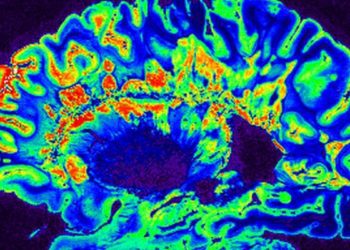Evobrutinib reduces imaging findings of multiple sclerosis but not clinical progression
1. The Bruton’s tyrosine kinase (BTK) inhibitor evobrutinib when compared to placebo treatment in multiple sclerosis patients showed the ability to reduce the number of gadolinium enhancing lesions on MRI imaging.
2. Key clinical outcomes of annualized relapse rates or change in a disability score were not different between patients treated with placebo compared to evobrutinib at 24 weeks.
Evidence Rating Level: 1 (Excellent)
Study Rundown: Multiple sclerosis (MS) is a progressive, demyelinating autoimmune disease that forms identifiable lesions in the central nervous system. Clinical goals of treatment are to reduce the frequency of relapse events and to slow disease progression. In addition to clinical measures of treatment efficacy, imaging findings of lesions in the central nervous system can be used as a proxy market for treatment efficacy. B cells involved in autoimmune disease are thought to play a role in MS, and thus augmenting their activity through the BTK signaling cascade may reduce their effect on MS disease progression. This phase 2 trial evaluated the BTK inhibitor evobrutinib compared to placebo and showed high doses of evobrutinib can significantly reduce the number of central nervous system lesions identified on MRI in MS patients, though clinical markers of disease progression were not altered with evobrutinib treatment at 24 weeks.
The strengths of this study include its evaluation of a novel therapy in a progressive disease, study of multiple dosing regimens, and use of dimethyl fumarate (DMF) as a reference therapy. The study is limited by the generalizability of the patient population, limited study size segmented into multiple treatment groups, and lack of comparison between the evobrutinib and DMF groups. Longer trials will be need to determine evobrutinib’s long term efficacy.
Click to read the study in NEJM
Relevant Reading: Efficacy and pharmacodynamic modeling of the BTK inhibitor evobrutinib in autoimmune disease models
In-Depth [randomized controlled trial]: This phase 2, international, randomized controlled trial enrolled patients between 2017 and 2018. Eligible patients were between 18 and 65 years of age, had multiple sclerosis, and had an expanded disability status scale (EDSS) score of between 0 and 6. Patients with progressive MS, no recent relapses, or exposure to DMF within 6 months of randomization were excluded. Patients were randomized in a 1:1:1:1:1 manner to groups receiving: evobrutinib 25mg daily (n=50), 75mg daily (n=51), 75mg twice daily (n=53), placebo (n=53), or DMF 240mg twice daily (n=54). Patients were evaluated for 24 weeks, with MRIs conducted at weeks 12, 16, 20, and 24. Relapse rates and disability scores were calculated at the end of the study. The primary endpoint of total gadolinium-enhancing lesions on MRI imaging during weeks 12 through 24 was: 3.85±5.44 in the placebo group, 4.06±8.02 in the evobrutinib 25mg group, 1.69±4.69 in the evobrutinib 75mg daily group, 1.15±3.70 in the evobrutinib 75mg twice daily group, and 4.78±22.05 in the DMF group. Compared with placebo, the evobrutinib 75mg daily group showed statistically fewer lesions (0.30 rate ratio; 95% confidence interval [CI], 0.14 to 0.63; P=0.005). All other groups did not have significantly fewer lesions identified compared to the placebo group. At 24 weeks compared to the placebo group, no treatment group had a significantly fewer annualized relapse rate. The median change from baseline to 24 weeks in the EDSS score was 0 in all 5 groups. A 52-week safety study was conducted which showed grade 3 or 4 adverse events occurred in between 13-15% of patients in the evobrutinib 75mg once or twice daily and DMF groups, with nasopharyngitis and liver enzyme levels being the most frequently observed adverse events.
Image: PD
©2019 2 Minute Medicine, Inc. All rights reserved. No works may be reproduced without expressed written consent from 2 Minute Medicine, Inc. Inquire about licensing here. No article should be construed as medical advice and is not intended as such by the authors or by 2 Minute Medicine, Inc






